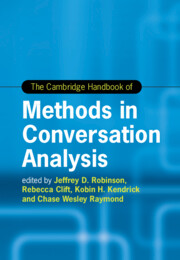Book contents
- Frontmatter
- Contents
- List of Tables
- List of Contributors
- Part I Introduction
- Part II Points of Departure
- Part III Collections
- Part IV Evidence
- 13 Evidencing Conversation-Analytic Claims: How Participants Orient to Social Action
- 14 Evidence for Claims about Interactants’ Sense-Making Processes
- 15 Conversation Analysis as a Comparative Methodology
- 16 The Epistemics of Epistemics: Validating Claims about Epistemic Stance in Conversation Analysis
- 17 Coding and Statistically Associating Inter-Action to Advance Conversation-Analytic Findings
- Part V Avenues into Action
- Part VI Situating and Reporting Findings
- Part VII Looking Forward
- Appendix I Jeffersonian Transcription Conventions
- Appendix II Multimodal Transcription Conventions
- Index
15 - Conversation Analysis as a Comparative Methodology
from Part IV - Evidence
Published online by Cambridge University Press: 06 December 2024
- Frontmatter
- Contents
- List of Tables
- List of Contributors
- Part I Introduction
- Part II Points of Departure
- Part III Collections
- Part IV Evidence
- 13 Evidencing Conversation-Analytic Claims: How Participants Orient to Social Action
- 14 Evidence for Claims about Interactants’ Sense-Making Processes
- 15 Conversation Analysis as a Comparative Methodology
- 16 The Epistemics of Epistemics: Validating Claims about Epistemic Stance in Conversation Analysis
- 17 Coding and Statistically Associating Inter-Action to Advance Conversation-Analytic Findings
- Part V Avenues into Action
- Part VI Situating and Reporting Findings
- Part VII Looking Forward
- Appendix I Jeffersonian Transcription Conventions
- Appendix II Multimodal Transcription Conventions
- Index
Summary
We explore the necessarily comparative nature of CA’s methodology. We focus less on cross-linguistic comparisons, comparisons between talk-in-interaction in different settings, and comparisons between speakers from diverse speech communities. Instead, we consider the micro ways in which analysts work comparatively, ways that generally go unnoticed in accounts of CA’s methodology but which underpin our approach in data sessions, to building collections of phenomena, and even our research strategies when exploring certain linguistic or interactional forms. We demonstrate what can be learned from comparisons to be found in data, for example between the different responses by different participants to the same observation or question, or between different speakers’ versions of events, or from the different forms used by speakers when referring to the ‘same’ thing but in different action environments. We highlight the significance of speakers’ production of different versions of the ‘same’ something in their self-corrections. Finally, we illustrate the utility of a research strategy in which comparisons are made between speakers’ use of a certain reference form at one point in an interaction and the form they use at other points in the same interaction. In short, we explore the methodological significance of endogenous comparisons in data.
- Type
- Chapter
- Information
- The Cambridge Handbook of Methods in Conversation Analysis , pp. 386 - 418Publisher: Cambridge University PressPrint publication year: 2024

